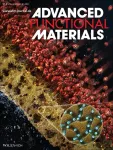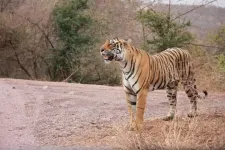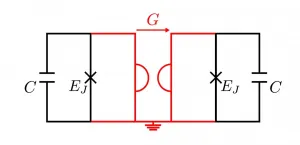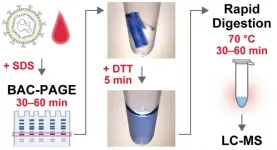How location dictates biological clocks of species: Study in beetles offers new insights
Scientists explore geographical variation in the biological clock of a new model organism, the Japanese red flour beetle
2021-02-18
(Press-News.org) One of the most intriguing features in all living beings is the "biological clock", an internal time-keeping mechanism that governs our behavioral pattern (such as the sleep-wake cycle). In fact, the biological clock dictates the developmental timing of various processes, such as when flowers bloom and insects reproduce. Biologists refer to these activities collectively as "circadian rhythms," owing to the rhythmic pattern in which they occur.
Since their discovery, circadian rhythms have been studied extensively, and today we know a great deal about how they work. But, it is still not understood why, in some species, these rhythmic traits can vary based on geographical location (also called "cline"). While studies focusing on the relationship between the strength of "amplitude" of the rhythm (time variation in the level of a particular measure, such as activity level) and latitude (variation between north and south) have been conducted in fruit flies, the findings are contradictory.
In a new study published in PLoS One, scientists in Japan, led by Prof. Takahisa Miyatake from Okayama University, decided to explore the problem using a new biological model: the red flour beetle, a common insect found throughout Japan. He explains, "Organisms living in northern and southern countries should have different rhythm traits and it would be interesting to know why these differences exist. We came up with the idea that such geographical variation in traits could be easily studied in the red flour beetle, which can be collected in a wide range of latitudes from all over the country."
Accordingly, the scientists collected red flour beetles from 37 rice mills in different parts of Japan and nurtured them under laboratory conditions emulating their natural environment. After an initial nurturing period of 20 days, they assessed the circadian rhythm of individual beetles (more than 1500 samples) by monitoring their locomotor activity (movement) for 10 days.
The findings showed that the rhythm strength decreased with increasing latitude such that beetles from the northern parts showed weaker circadian rhythms than their southern counterparts. However, changing longitudes (east to west) showed no significant difference. Interestingly enough, despite the large sample size, they did not observe any variation in the rhythm period with latitude or longitude, which contradicted the findings of previous studies.
The scientists ascribed the weaker rhythmic amplitude at higher altitudes to its more extreme and harsh environments, which possibly had more influence on the beetle's behavior than its biological clock. As for the unchanging rhythm period with location, they speculated that the flow of genetic material from one beetle population to another was likely more than hypothesized, thus washing out their genetic differences and leading to uniform rhythm periods.
Prof. Miyatake is excited by these findings and their possible implications. He concludes, "Many insects are expanding their distribution areas to the north due to global warming, and the nature of their circadian rhythms may change accordingly. We may be able to open up a new research field to see if the nature of variation in the biological clock of insects is also applicable to humans!"
Does this mean our bodies might be working in a certain way depending on our location? We don't entirely know yet, but hopefully, future studies will reveal a lot more.
INFORMATION:
[Attachments] See images for this press release:
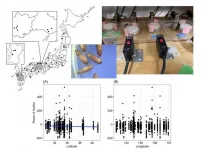
ELSE PRESS RELEASES FROM THIS DATE:
2021-02-18
When women undergo surgical treatment for breast cancer, they often also have reconstructive surgery but new QUT research reveals many women feel left out of the decision making.
An interdisciplinary study from researchers in QUT's Centre for Behavioural Economics, Society and Technology (BEST), Engineering Faculty, and School of Nursing, along with Dr Jeremy Hunt a Fellow of the Royal Australasian College of Surgeons and Dr Tim Peltz from the University of New South Wales, on Knowledge, consultation time and choice in breast reconstruction has just been published in the British Journal of Surgery.
"Approximately one in seven Australian women will be diagnosed with breast cancer in their lifetime," ...
2021-02-18
Most Chinese working in the cities return to work today after a 7-day public holiday of Spring Festival. The annual Spring Festival, which also marks the start of Chinese New Year, traditionally begins with the second new moon following the winter solstice, usually in January or February. Like westerners on Thanksgiving and Christmas, people across China return to their hometown to reunite with family and friends. However, the sudden outbreak of COVID-19 last year halted the largest holiday mobilization in the world. In response to the crisis, in late 2019, local governments launched ...
2021-02-18
After nearly a decade of research, a new test that detects the magnetic properties of malaria-infected blood could soon be used to help eliminate the mosquito-borne disease.
Dr Stephan Karl, a Senior Research Fellow in Malaria and Vector Biology at James Cook University's Australian Institute of Tropical Health and Medicine, has led an international study to field-test a new tool in the fight to eliminate the disease, which had 229 million reported cases in 2019.
"Malaria is easily treated but it is actually hard to diagnose, and because of that there ...
2021-02-18
Quantum computers promise not only to outperform classical machines in certain important tasks, but also to maintain the privacy of data processing. The secure delegation of computations has been an increasingly important issue since the possibility of utilizing cloud computing and cloud networks. Of particular interest is the ability to exploit quantum technology that allows for unconditional security, meaning that no assumptions about the computational power of a potential adversary need to be made.
Different quantum protocols have been proposed, all of which make trade-offs between computational performance, security, and resources. Classical protocols, for example, are either limited ...
2021-02-18
Sample pretreatment processes such as concentration or classification are essential to finding trace substances present in a fluid. In scientific communities recently, prolific research is being conducted on sample pretreatment techniques utilizing electrokinetics.1 However, due to the lack of commercial anion-permselective material - an essential component - its potential application is limited to only negatively charged particles. To this, a research team at POSTECH has found a way to isolate and concentrate only the cationic samples.
A POSTECH research team led by Professor Geunbae Lim, Ph.D. candidate Minsoo Lee, and Dr. Hyukjin J. Kwon of the Department of Mechanical Engineering developed a novel type of multiscale-porous anion exchange ...
2021-02-18
Genetic variation is like money in the bank: the more you have, the better your chances of survival in the future. Population bottlenecks decrease genetic variation, especially in endangered species. An individual's genome comprises the events that have impacted genetic variation over time, and relatively recent sequencing technologies allow us to read and interpret genetic variation across the genome. Although tigers have received significant conservation attention, little is known about their evolutionary history and genomic variation. This is especially true for Indian tigers, and ...
2021-02-18
Working with colleagues from Germany and the US, researchers at Leipzig University have achieved a breakthrough in research into how cancer cells spread. In experiments, the team of biophysicists led by Professor Josef Alfons Käs, Steffen Grosser and Jürgen Lippoldt demonstrated for the first time how cells deform in order to move in dense tumour tissues and squeeze past neighbouring cells. The researchers found that motile cells work together to fluidise tumour tissue.
Käs led the research project in cooperation with Professor Lisa Manning from Syracuse University (US) and Professor Bahriye Aktas from Leipzig University Hospital. They have now ...
2021-02-18
Building a universal quantum computer is a challenging task because of the fragility of quantum bits, or qubits for short. To deal with this problem, various types of error correction have been developed. Conventional methods do this by active correction techniques. In contrast, researchers led by Prof. David DiVincenzo from Forschungszentrum Jülich and RWTH Aachen University, together with partners from the University of Basel and QuTech Delft, have now proposed a design for a circuit with passive error correction. Such a circuit would already be inherently fault protected and could significantly accelerate the construction of a quantum computer with a large number of qubits.
In order to encode quantum information ...
2021-02-18
Mass spectrometry (MS) is a powerful method for biomarker analysis because it enables highly sensitive and accurate measurement of target molecules in clinical samples. The application of MS to clinical diagnosis, such as neonatal metabolic screening, has been progressing with a focus on metabolite markers. MS measurement of proteins is currently mainly used for novel marker discovery studies, but there is a growing interest in its application in clinical marker diagnosis as an alternative to immunoassays.
MS-based quantification of protein biomarkers is mainly performed by a bottom-up approach using peptide fragments obtained by enzymatic ...
2021-02-18
A study of over 1,700 U.S. young people exposed to four major hurricanes found that just a few of them reported chronic stress, and the trajectories among most youth reflected recovery or low-decreasing post-traumatic stress (PTS) symptoms, according to research recently published in JAMA Network Open.
Titled "Trajectories of Post-traumatic Stress in Youths After Natural Disasters," the inquiry, conducted from August 2017 to August 2020, combined data from four studies of youths ages six to 16 who attended schools near the respective destructive paths of Hurricanes Andrew (1992), Charley (2004), Ike (2005) and Katrina (2008), from three to 26 months following the disasters. Fifty-four percent of ...
LAST 30 PRESS RELEASES:
[Press-News.org] How location dictates biological clocks of species: Study in beetles offers new insights
Scientists explore geographical variation in the biological clock of a new model organism, the Japanese red flour beetle


